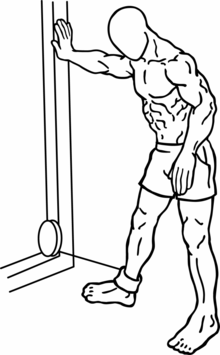User:Piriformis123/sandbox
Prevention
[edit]The secondary and most common form of piriformis syndrome, is a result of previous injury due to trauma. [1] Larger injuries include trauma to the buttocks while micro traumas result from small repeated bouts of stress on the piriformis. [2] Secondary causes are preventable, especially those occurring in daily activities. Periods of prolonged sitting, especially on hard surfaces, produce minor stress that can be relieved with bouts of standing. An individual’s environment including lifestyle factors and physical activity, determine susceptibility to trauma. Taking precaution during high impact sports or working in physically demanding conditions help decrease risk. To avoid these situations, property safety and padded equipment should be worn for protection during any type of contact. In the work place, individual’s must be aware of their surroundings and recognize anything in their routine that may produce micro or macro traumas. Other prevention strategies include warming up before physical activity, practicing correct exercise form, stretching, and strength training. [3] Warm ups decrease the risk of injury during flexion or rotation of the hip. Stretching increases range of motion, while strengthening hip adductors and abductors allows the piriformis to tolerate trauma more readily. [4] It is important to stop activity when experiencing pain so further damage does not result.

- ^ Boyajian-O'Neill, L., McClain, R., Coleman, M., Thomas, P. (2008). Diagnosis and Management of Piriformis Syndrome: An Osteopathic Approach. The Journal of the American Osteopathic Association, 108 (11), 657-664.
- ^ Jawish, R., Assoum, H., Khamis, C. (2010). Anatomical, Clinical and Electrical Observations in Piriformis Syndrome. Journal of Orthopaedic Surgery and Research. 5 (3), 1749-1799.
- ^ Keskula, D., Tamburello, M. (1992). Conservative Management of Piriformis Syndrome. Journal of Athletic Training. 27 (2), 102-110.
- ^ Boyajian-O'Neill, L., McClain, R., Coleman, M., Thomas, P. (2008). Diagnosis and Management of Piriformis Syndrome: An Osteopathic Approach. The Journal of the American Osteopathic Association, 108 (11), 657-664.

